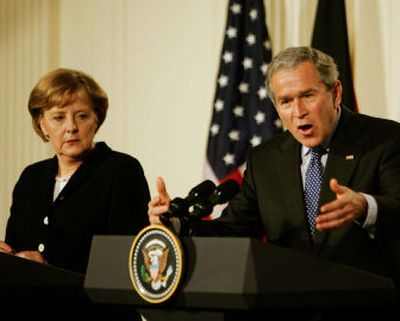World pressure on Iran mounts

WASHINGTON – On Friday, President Bush declared that a nuclear-armed Iran would pose “a grave threat to the security of the world.” The comment was part of his effort to rally support from other major powers for U.N. Security Council action, unless a defiant Tehran abandons any aspirations for nuclear weapons.
In using the phrase “grave threat,” Bush invoked the same language he used before launching the invasion of Iraq in 2003, and he highlighted in particular the danger to Israel. But during a White House appearance with visiting German Chancellor Angela Merkel, Bush stressed that he hopes to forge a “common consensus” with other world leaders for a diplomatic resolution of the escalating confrontation with Iran.
The joint front presented by Bush and Merkel contrasted with the schism between the United States and major European allies during the months leading up to the Iraq war and underscored the more multilateral strategy pursued by the White House in trying to prevent Iran from building nuclear bombs. Not only do Germany, France and Britain now support taking Iran to the United Nations, but Russia also has indicated to Washington that it would permit the matter to go before the Security Council as well.
China, the council’s fifth veto-wielding member, however, cautioned against a referral, although it did not say whether it would actually block such a move. And just days after breaking U.N. seals on its nuclear plant in Natanz to resume uranium enrichment research, Iran threatened to end its cooperation with U.N. nuclear inspectors if it is hauled before the Security Council.
It remains unclear what the council would be willing to do to exert pressure on Iran. U.S. and European diplomats privately said they are mapping out a series of possible steps, starting with a stern statement issued by the council president.
They will meet with Russian and Chinese counterparts in London on Monday. But German and French diplomats called any talk of economic sanctions “premature.” And Britain’s foreign minister all but ruled out military action, at least for now.
The move to take the issue to the Security Council followed the collapse of more than two years of negotiations led by Germany, France and Britain. Iran insists it wants to develop nuclear power only for civilian purposes, but it rejected incentives to halt programs that could be used to build weapons.
Merkel on Friday expressed the European frustration at Iran’s stance. “Iran refused every offer we made, even the Russian offer,” she said, referring to a proposal by Moscow to enrich uranium for Iran for nuclear reactors. “We will certainly not be intimidated by a country such as Iran,” Merkel said.
In their first meeting since she took over the German government as head of a Christian Democrat-led coalition, Bush and Merkel moved to repair relations that fractured under her Social Democrat predecessor, Gerhard Schroeder, who opposed the Iraq war so vocally that for a time, Bush refused to speak with him. Merkel’s conservative stances more closely mirror Bush’s, and she termed their talks Friday “a good start.”
But the two split on the future of the U.S. detention facility at Guantanamo Bay, Cuba, which Merkel has said should eventually be shut down. “Guantanamo is a necessary part of protecting the American people,” Bush said, “and so long as the war on terror goes on, and so long as there’s a threat, we will, inevitably, need to hold people that would do ourselves harm.”